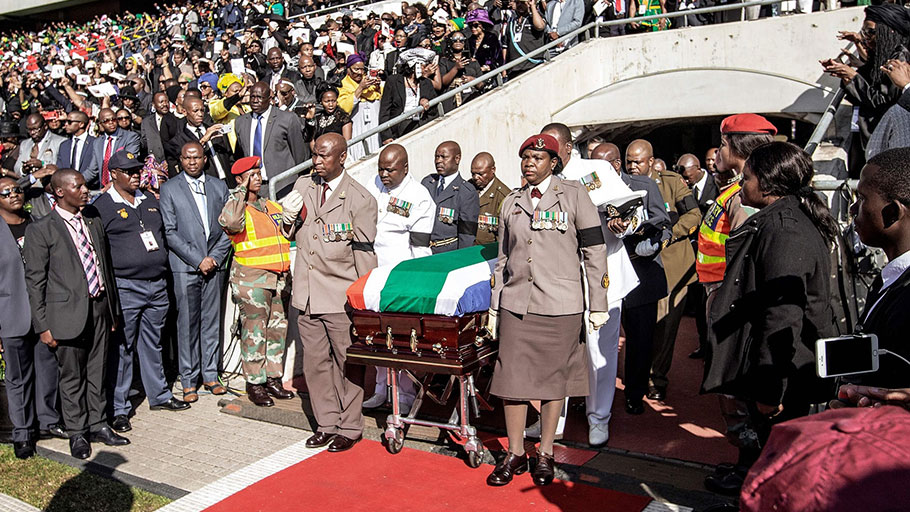South African military personnel bring in the coffin at Orlando Stadium in Soweto for the funeral ceremony of Winnie Madikizela-Mandela. Photograph by Gianluigi Guercia, AFP, Getty Images.
Tens of thousands attend emotional service for veteran anti-apartheid activist.
Tens of thousands of South Africans have filled a stadium in Soweto for the funeral service of Winnie Madikizela-Mandela, a heroine of the anti-apartheid struggle in South Africa but also one of its most controversial figures.
Shouts of “Long live Comrade Winnie”, “the struggle continues” and “power to the people” rang out around the stadium on Saturday throughout a powerful and emotional service to the activist, politician and former wife of Nelson Mandela.
A joyful and tearful crowd listened, sang and danced to prayers, tributes and the anthems that sustained those fighting for freedom in South Africa through decades of repression.
President Cyril Ramaphosa, dignitaries from around the continent and many of South Africa’s most famous political and cultural figures joined rank and file members of the ruling African National Congress and well-wishers from around the country.
In his eulogy, Ramaphosa called Madikizela-Mandela proud, strong, brave and articulate. “Winnie’s life was of service to her people, it was a life of compassion … Like many of the great leaders of her generation she understood that the suffering she endured defined society,” he said.
“She felt compelled to join a struggle that was as noble in its purpose as perilous in its execution. Loudly and without apology, she spoke truth to power.
“We are a nation hurt by our past, numbed our present, hesitant about the future … she has united us in sorrow. She was our conscience.” Entire stands were packed with red-shirted activists of the populist leftwing opposition Economic Freedom Fighters party, which sees itself as continuing of Madikizela-Mandela’s efforts to bring about a radical economic transformation in South Africa.
The stadium is little more than a mile from where Madikizela-Mandela lived during the darkest days of apartheid and until her death.
Thousands have signed a condolence book outside her home on a modest street in the Orlando West neighbourhood, where overcrowded single-storey homes with tin roofs still line the slopes of rocky outcrops.
Among the bouquets piled outside its gate, a new memorial bears the legend “I am the product of the masses, of my country and the product of my enemy”, a 1996 quote attributed to Madikizela-Mandela.
Her death has prompted a fierce debate in South Africa between her many admirers and a smaller number of detractors.
“Some praise ‘Winnie’ because she was a fearless fighter for justice and a feminist icon; others excoriate her because she was a violent egomaniac. The contest has been shrill and depressing in equal measure,” wrote Palesa Morudu, a publisher and writer, last week.
During the funeral service, her daughter Zenani Mandela-Dlamini said recent days had shown “South Africa and the world hold men and women to different standards of morality”.
“My mother was one of many women who rose up against a nuclear-armed state to bring us the peace and democracy we enjoy today. The battle for our freedom was not some polite picnic to which you arrive with your best behaviour,” she said to cheers.
Born in the poor Eastern Cape province, Madikizela-Mandela’s childhood was “a blistering inferno of racial hatred”, in the words of her British biographer Emma Gilbey. The young hospital social worker married Mandela shortly before the ANC leader was sentenced to life imprisonment for treason in 1962.
During her husband’s 27-year incarceration, Madikizela-Mandela campaigned tirelessly for his release and for the rights of black South Africans. Her courage and defiance brought her a huge personal following.
Tortured and subjected to repeated house arrest, she was kept under surveillance and, in 1977, banished to a remote town in another province.
As the violence of the apartheid authorities reached new intensity, Madikizela-Mandela was drawn into a world of internecine betrayal, reprisals and atrocity.
Most notoriously, she was found guilty of ordering the kidnapping of a 14-year-old boy, Stompie Seipei, also known as Stompie Moeketsi, who was beaten and killed by members of her personal bodyguard in 1989.
Within a year, she gave the clenched-fist salute of black power as she walked hand-in-hand with Mandela out of Cape Town’s Victor Verster prison on 11 February 1990.
The end of apartheid marked the start of a string of legal and political troubles.
Madikizela-Mandela refused to show remorse for abductions and murders carried out in her name, and separated from her husband in 1992. She was sacked from her ministerial post in 1995 after allegations of corruption and the couple divorced a year later, but her popular appeal remained strong.
She challenged President Thabo Mbeki over harmful HIV policies and in 2008 she took up the cause of immigrants under attack in widespread riots. A year later, she won a parliamentary seat. More recently, she spoke out against official corruption.
Madikizela-Mandela’s casket, draped in the South African flag, was transported from her home to the stadium in the same hearse that had carried the remains of Mandela.















